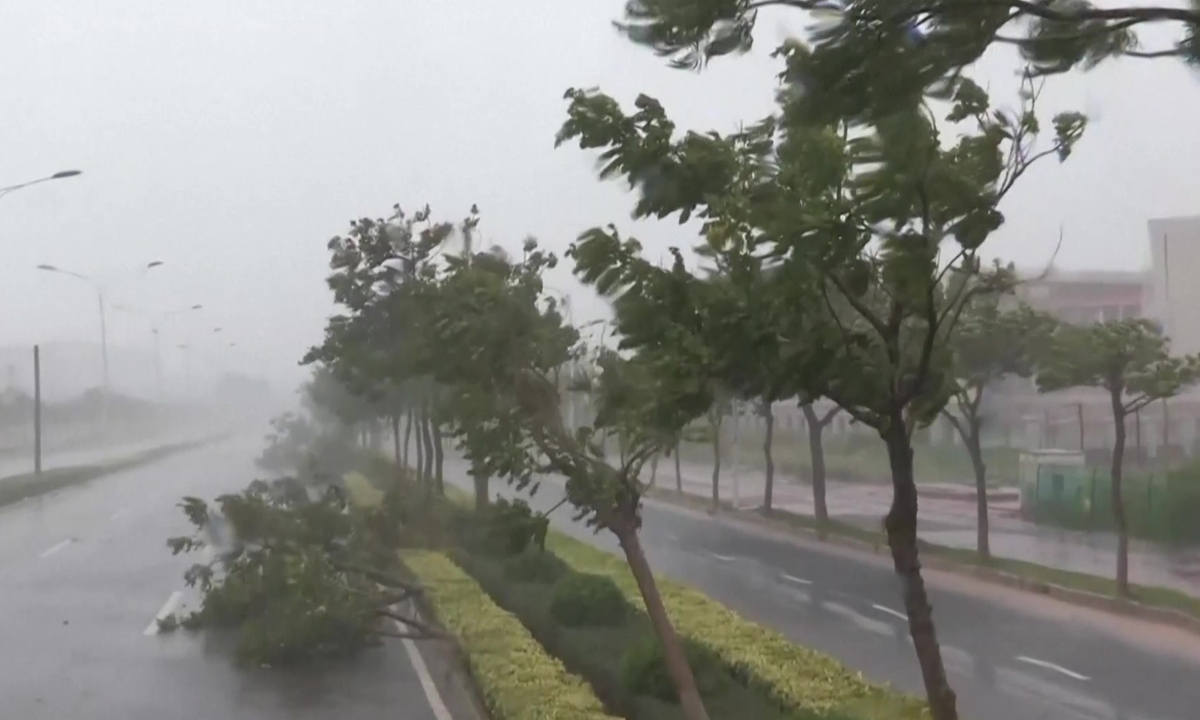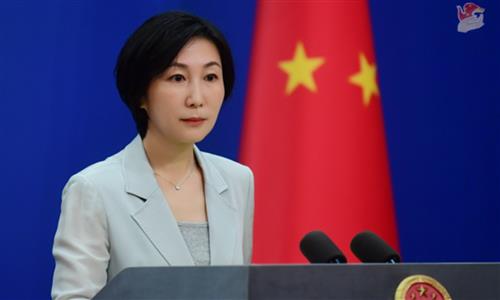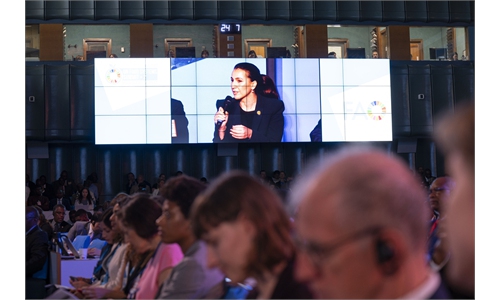UN chief warns 'era of global boiling has arrived'; intl cooperation needed more than ever
China shoulders dual climate challenge of typhoon and continuing heatwaves; efforts to curb global warming continues

Trees fall down due to the impact of typhoon Doksuri in East China's Fujian Province on July 28, 2023. Photo: VCG
After the world has been suffering a month of heat with record high temperatures, UN secretary general, António Guterres, warned on Thursday that the "era of global boiling has arrived." Scientists confirmed that July is on track to be the world's hottest month on record.
Meanwhile, China is battling with concurrent climate disasters with sizzling temperatures baking some parts in the north, while the south region is steeling for the landing of typhoon Doksuri, which has already affected more than 724,600 people.
As extreme weather takes its toll globally, Chinese experts called on certain countries to set aside their political agenda and take drastic action on international cooperation to curb global warming.
"Climate change is here. It is terrifying. And it is just the beginning," Guterres said. "It is still possible to limit global temperature rise to 1.5C [above pre-industrial levels], and avoid the very worst of climate change. But only with dramatic, immediate climate action."
Guterres's comments came after scientists confirmed on Thursday that the past three weeks have been the hottest since records began and July is on track to becoming the hottest month ever recorded.
In Europe, passengers on board at least two Scoot flights from Athens to Singapore had to fly without their baggage after the heatwave engulfing Greece affected aircraft performance. Over 170 million Americans are under heat alerts this week, according to the National Weather Service, as a heatwave that has affected the southern US for weeks has expanded into parts of the Great Plains, midwest and northeast US, media reported.
Typhoon Doksuri made landfall in East China's Fujian Province on Friday morning, battering affected regions with high waves and pouring rain. Residents along the coast claimed their houses have been shaking for hours due to strong storm.
Some areas in Fujian's Quanzhou suffered power and electricity outages because of Doksuri.
As of Friday afternoon, an estimated 724,600 people have been affected by the typhoon in Fujian, and 124,400 have been relocated. Doksuri caused direct economic losses of 52.27 million yuan ($7.29 million), according to Fujian authority.
The typhoon is rapidly heading north, and is expected to result in heavy rainfall in capital Beijing and nearby regions, according to China's National Meteorological Center.
Doksuri followed on the heels of Typhoon Talim, which receded in a week. "Global warming has led to an increase in water vapor in the air and rise of ocean temperatures. Those conditions are conducive for strong typhoons to form," Xu Xiaofeng, chief of the China Meteorological Service Association, told the Global Times.
Xu warned of the looming danger of extreme weather, saying that in general, China is suffering from high temperatures and low precipitation this year, so we need to prepare for the rapid transition between severe drought and extreme rainfall in certain regions.
North China and some other provinces have been engulfed by rare heatwaves this summer. A total of 43 meteorological observation stations in Northwest China's Xinjiang Uygur Autonomous Region showed recent temperatures exceeded 45C in recent days. Sanbao village in Xinjiang's Turpan has surpassed 52.2C, breaking historical records.
Wang Yawei, an official from the department of disaster relief and public services from the China Meteorological Administration said China has suffered six regional heatwaves this year. 26 weather observation stations nationwide reported record-breaking temperatures.
Wang predicted that China is on course for four heatwaves in August, leading to mounting pressure on the country's electricity supplies.
Officials from China's National Development and Reform Commission said on Wednesday that electrical loads in China reached historical highs twice this summer. The peak load this year came to 1.339 billion kilowatt hours, 49.5 million more than last year's peak load.
Global contributor
China is moving steadfastly towards its goal of achieving peak carbon dioxide emissions before 2030 and achieving carbon neutrality before 2060.
The cumulative volume of carbon emission allowances on China's carbon market was 237 million tons by June 30, with a turnover of more than 10.91 billion yuan, Vice Minister of Ecology and Environment Guo Fang said at a National Low-Carbon Day activity earlier this month.
The country is actively promoting global cooperation to jointly act on global warming.
After face to face talks in Beijing last week, Xie Zhenhua, China's special envoy for climate change, held a video dialogue with US Special Presidential Envoy for Climate John Kerry upon invitation on Thursday, according to Xinhua News Agency.
Xie and Kerry exchanged views on strengthening China-US dialogue, and on cooperating to promote global, multilateral efforts to tackle climate change. The two sides agreed to maintain close communication, Xinhua reported.
Recently, Xie also met with Ambassador of the United Arab Emirates to China Hussain bin Ibrahim Al Hammadi. The pair exchanged in-depth views on the upcoming COP28 to the United Nations Framework Convention on Climate Change, and on climate cooperation between the two countries, according to Xinhua.
"COP28 UAE will be a milestone moment when the world takes stock of its progress on the Paris Agreement, and when countries realize the efforts they made in the past are far from enough to stop the world getting hotter," Lin Boqiang, director of the China Center for Energy Economics Research at Xiamen University, told the Global Times.
He pointed out that the resumption of negotiations between China and the US on climate change brings a glimmer of hope for global efforts on climate change. However, the US must set aside its selfish political agenda, and stop pressuring China on its path, method, pace and intensity of emission cuts, said Lin, noting that the freshly built cooperation is fragile.




